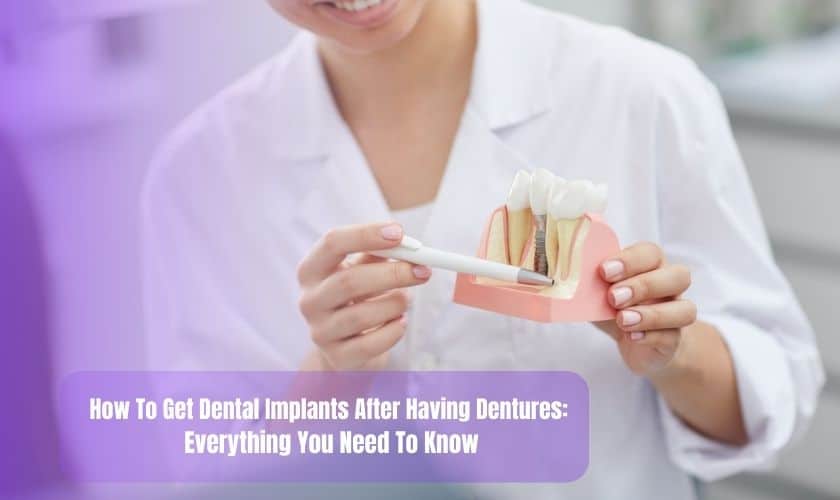If you’ve had dentures for a long time, it’s likely that they no longer fit properly or they’re starting to break down. In this case, dental implants may be the right solution for you! But what are dental implants? How do they work? And how do I know if they’re right for me? Don’t worry—we’ve got all of your questions answered below.
Dental implants are posts placed into the upper or lower jawbone and act as an anchor for replacement teeth.
Dental implants are posts placed into the upper or lower jawbone and act as an anchor for replacement teeth. Implants are made of titanium and are designed to fuse with your bone over time.
Dental implants can replace individual teeth, multiple missing teeth, or even an entire arch of missing teeth (full arch).
Prior to dental implant placement, a dentist will create a custom-made tooth that can be attached to the implant.
Prior to dental implant placement, a dentist will create a custom-made tooth that can be attached to the implant. The process begins with an impression of your mouth being taken. This impression is sent to a lab where the custom teeth are designed and made for you. The lab will create teeth that fit snugly over the implants, making them feel like real teeth. When everything is ready, your dentist will attach these new “implants” (or fake teeth) into place using cement or screws.
The process of getting dental implants is more involved than having dentures fitted.
The process of getting dental implants is more involved than having dentures fitted. Your dentist will have to make an impression of your jawbone and send it to a dental lab, where they will create a mouthguard-like structure called an abutment. This abutment attaches to the implant and acts as its base in your jawbone.
Once your dental implant is put in place, you can go ahead with any other treatment you need (such as tooth whitening) before having them fitted with crowns or bridges.
There are several advantages to getting dental implants over getting dentures.
If you are wondering whether or not dental implants are right for you, there are several advantages to getting dental implants over dentures.
- Dental Implants Are More Durable Than Dentures
Dentures can be quite durable, but they do not provide the same level of stability as a dental implant. When a person has a full set of natural teeth and then loses them all at once, it’s common for their bite to shift in different directions over time as they get used to eating without them. This leads to less stable bites and makes it harder for them to chew their food properly, leading to bad oral health and nutritional deficiencies due to malnutrition (malnourishment).
Dental implants tend to last longer than dentures because they are supported by your jawbone and not your gums or lips, as with dentures.
Dental implants tend to last longer than dentures because they are supported by your jawbone and not your gums or lips, as with dentures. When you have a dental implant, you can expect it to last anywhere between 10 to 20 years, depending on how well you care for them. Dentures must be replaced every 5-7 years as they wear out over time due to friction against your gum tissue when eating food or speaking with others.
Dentures can slip, slide or be uncomfortable if they do not fit properly in the mouth. Dental implants are more stable and tend not to move around when chewing food compared with other types of tooth replacement options available today, such as bridges and partial fillings, which require adhesives that may wear off over time, causing cracks along their surface area, making them difficult for patients who require constant adjustments due lack thereof being able to afford these expensive procedures every few years.”
Dental implants also reduce stress on natural teeth as they will no longer have to bear the stress of chewing.
Dental implants are supported by your jawbone, not your gums or lips. This means that they don’t put pressure on your natural teeth and can reduce the risk of gum disease.
Getting rid of your dentures is usually one of the first steps in getting dental implants on either side of your mouth. Take your time with comfort while you’re at it!
Before getting dental implants, you may need to get rid of your dentures. Getting rid of your dentures is usually one of the first steps in getting dental implants on either side of your mouth. If you’re currently wearing them, don’t skimp on comfort while you’re at it!
Dentures can be uncomfortable for many reasons: they can cause sores and ulcers around the gums; they can also cause jawbone loss as people lose weight over time; or maybe even because they sit poorly in their mouth due to ill-fitting teeth or an incorrect bite pattern. With any kind of oral appliance like this–whether it’s a retainer or another type–you must find someone who knows how to fit it properly so that there aren’t any problems with speech or eating ability down the road.
Learn more about this process to make an informed decision about what options are right for you!
Dental implants are a great way to replace missing teeth and restore your smile.
They can also improve the health of your mouth by removing decay-causing mouths from food, allowing you to eat healthier foods and maintain good oral hygiene.
However, there are some disadvantages as well: dental implants may not be covered by insurance plans; they’re an expensive procedure that requires multiple visits with the dentist; they require special care after surgery (like avoiding hard foods) until healing is complete; and in rare cases, it may be necessary for patients who have had dental implants removed due to complications or other issues related directly back down into their jawbone through an incision made just under where those particular teeth used to sit on the top-level surface area where gum tissue covers up most bones found throughout head region underneath lips but above chin line where humans tend towards speech production during casual conversation versus formal speeches given during professional meetings/conferences held within workplace settings such as office buildings where people regularly interact each day without fail every week throughout entire year…
Conclusion
In this article, we’ve looked at the pros and cons of getting dental implants after having dentures. We hope it has shed some light on what this process entails and how it compares with other options like crowns or bridges. If you still need to decide whether to go ahead with your new smile plan, why not book an appointment with one of our specialists? They’ll be able to give advice based on their expertise and experience working with people like you!
FAQs
Dental implants are a type of restorative dentistry that replaces the tooth root with an implant post, which supports a crown or bridge. It’s a permanent solution to tooth loss and can restore your ability to eat and speak confidently.
Dentures are removable prosthetics of two parts: the upper and lower plate. These parts are held in place by suction using natural saliva, so they can be removed for cleaning and brushing your teeth daily. This can irritate the gums and cheeks and cause discomfort for those who wear them all day. Dental implants are fixed into place permanently, so there’s no need for suction or adjustments throughout the day—making them much more comfortable than dentures!
The entire process, from start to finish, will take about 2-3 months, depending on how many procedures need to be done on each side (upper jaw vs. lower jaw). The first step is getting X-rays taken to see what needs work done.





